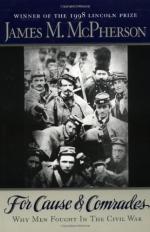
|
| Name: _________________________ | Period: ___________________ |
This test consists of 5 short answer questions, 10 short essay questions, and 1 (of 3) essay topics.
Short Answer Questions
1. As "Chapter 6: A Band of Brothers" opens, McPherson says that Civil War soldiers wrote much about all BUT WHICH of these synonyms?
2. During "Chapter 5: Religion is What Makes Brave Soldiers," which military historian is quoted from his book, "Men Against Fire"?
3. When a young private predicted the bullet had not been made that would shoot him, McPherson notes he was correct because the private died in what prison?
4. In 1862, a private in the 38th North Carolina wrote to his wife that, if he were to be killed, he hoped to be reunited with his daughter __________.
5. A private from which state recounted an amazing amount of energy while describing the battle of Gaines Mill?
Short Essay Questions
1. For what purpose does McPherson relate the story of James and John Welsh in the opening of "Chapter 2: We Were in Earnest"?
2. How did the Calvinist doctrine of predestination factor into soldiers' lives in the discussion of religion?
3. According to "Chapter 5: Religion is What Makes Brave Soldiers," why does religion become so important to soldiers during war?
4. What effect did the prospect of death have on the Confederate army during the discussion of religion?
5. How did Civil War enlisted men respond to military discipline, as discussed in "Chapter 4: If I Flinched, I was Ruined"?
6. How did the tone of soldiers' letters home change from their initial zeal after the first few battles were over?
7. What ideological concepts and convictions initially motivated the Union soldiers to fight in "Chapter 2: We Were in Earnest"?
8. What can readers conclude about the use of alcohol as a motivational tool, during "Chapter 4: If I Flinched, I was Ruined"?
9. What methods did officers used after they were confronted with undisciplined troops early in the war?
10. How did Civil War soldiers react to fear in "Chapter 3: Anxious for the Fray"?
Essay Topics
Write an essay for ONE of the following topics:
Essay Topic 1
Compare and contrast soldiers' initial combat motivation with combat exhaustion. Be sure to explain when a soldier would experience each and what the reaction would be, in addition to analyzing the differing tone that accompanies each stage in the book. Include quotes and supporting information from the text.
Essay Topic 2
Based on McPherson's discussions, analyze and discuss three ways in which the fact that the Northern and Southern armies were comprised primarily of volunteers affected a key component of the war as a whole. Include supporting information from the book and be sure to cite sources as necessary.
Essay Topic 3
In a well-developed essay, analyze and discuss the effect being in the presence of slavery had on non-abolitionist Union soldiers. Include quotes and supporting information from the text.
|
This section contains 1,172 words (approx. 4 pages at 300 words per page) |

|




